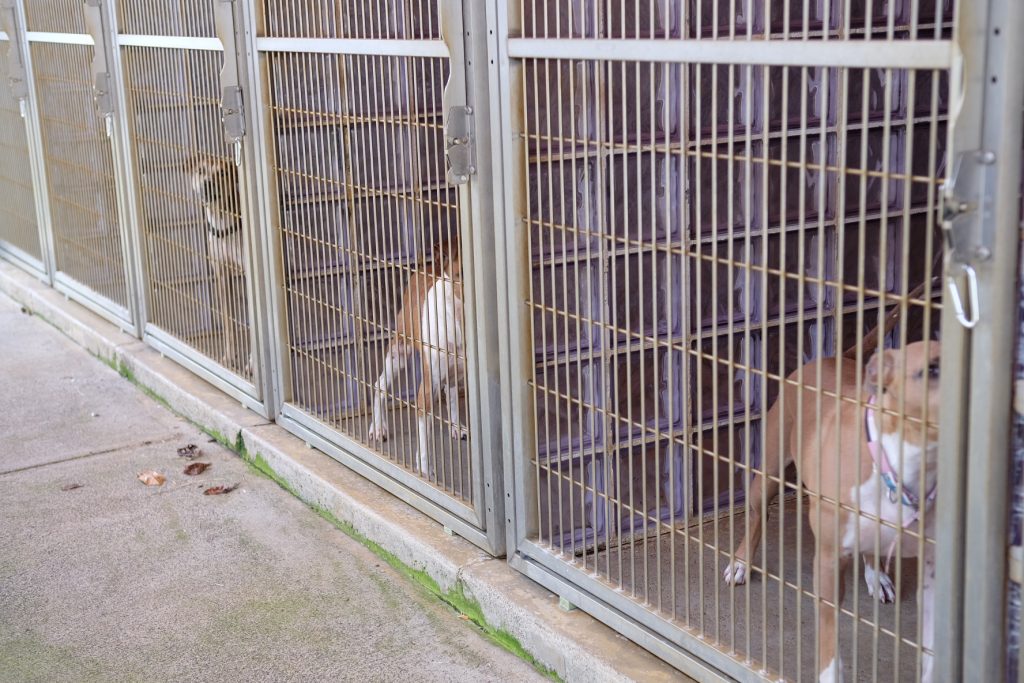Kaua‘i Humane Society at risk of losing its no-kill shelter status

Kaua‘i Humane Society is at risk of losing its no-kill shelter status which could result in a loss of funding to the nonprofit.
With $10,000 in daily operating costs, the loss of any donations could ultimately impact various services the organization provides to the community to take care of animals as well as finding animals permanent homes.
The facility has been a no-kill shelter for the past three to four years. However, with the dip in adoptions and rise in animal intakes, staff are seeing more injured and sick animals. They also have dogs and cats who are suffering from fear, stress and anxiety caused by living in the overcrowded shelter that is at 255% capacity, said Nicole Schafer-Crane, the shelter’s executive director.
These factors have resulted in an increase in humane euthanizations, according to shelter officials.
From Jan. 1 to Sept. 14, the humane society has taken in 2,398 animals, with at least 1,000 born this year. Schafer continues to plead with the public to foster, adopt and spay or neuter their animals.
During that same timeframe, Caitlin Fowlkes, marketing and communications coordinator at Kaua‘i Humane Society, said 31 animals were euthanized for behavior or severe aggression, and 152 were put down because they were unhealthy or suffered untreatable medical conditions.
“In the last week and a half, we’ve seen the second wave of kitten season start up meaning we’ve been getting in a lot of sick kittens only a few days old,” Fowlkes explained. “A neonate kitten removed from its mother has a less than 1% chance of survival.”
From Jan. 1 to Sept. 14, 2022, Fowlkes said, 75 animals were euthanized.
“It’s important to realize that we do everything in our power first before we ever approve a euthanasia,” Fowlkes said. “We send staff home with animals, especially medical cases.”
A no-kill shelter requires a 90% positive live outcome for animals through adoptions, transfers or reuniting with owners. This live outcome doesn’t factor in animals that died of natural causes or owner-requested euthanasia.
The shelter’s outcome has fluctuated throughout the year. In August it was 87% and it is now 89%.
The shelter is currently housing approximately 323 cats and 60 dogs, including 130 cats and kittens and seven dogs in foster care. The shelter only has 33 kennels meant to house dogs for adoption, and 32 cages for cats and kittens.
“We’re tapped out,” Schafer-Crane said. “If there isn’t a cage available we have to make tough decisions.”
From Jan. 1 to Sept. 14 there have been the following:
- Adoptions – 803
- Return to owner – 258
- Transfers – 418
- Of the 2,398 animals taken in, 62% were strays, 18% were surrendered by their owners and 20% of animals were seized for protective custody
During the same timeframe in 2022, there were the following:
- Adoptions – 717
- Return to owner – 248
- Transfers – 376
- The shelter took in 1,635 animals — 77% were strays, 21% were owner-surrendered and 2% were seized.
Some of the animals brought to the shelter this year were in bad shape. Recently, three dogs were dropped off after being dragged behind vehicles. Kittens with umbilical cords wrapped around them also ended up at the shelter, cold and starved.
In these cases, Schafer-Crane said it’s more humane to put the animals down. There also are cases where animals are put down because their quality of life has declined significantly.
With the overcrowding, Schafer-Crane said the shelter is seeing more illness in cats and more dogs needing to be medicated for anxiety.
“Some dogs will become obsessive-compulsive and go around circles over and over,” Schafer-Crane said. “Or they’ll sit in a corner. Or, they’re so overly stressed they start chewing on themselves.
“As much as we try, it’s still a cage, it’s a noisy environment.”
Two members of management at the shelter must agree to approve euthanization. The decision is made based on the behavior, medical analysis and staff time.
“It’s never an easy decision to have to end a life, but there is a process to how that decision is made, and it’s not made lightly,” Fowlkes said.
The humane society runs several programs to help get animals adopted or support pet owners who might be struggling with animal care, food, etc. Some programs include:
- Food pantry for pets.
- Outreach clinics where they provide free pet food, vaccines, microchips, leashes, collars, and spay and neuter vouchers.
- Pet boarding and access to our dog parks for a small annual fee.
- Low-cost vaccines, microchips, flea and tick preventative and dewormer through our vaccine clinic
- Low-cost preventative vet care through our Community Care Center.
- Offer assistance to landlords who want to offer pet-friendly housing
The nonprofit just got a grant to offer free cat vaccines. The shelter also received a grant this year making all spay and neuters for all cats and dogs only $35.
Kaua‘i Humane Society has 148 animals active in foster care and works with 27 rescue partners on the mainland, transferring animals as often as they can.
“We are trying everything and it just never feels like enough,” Schafer-Crane said.
On Sept. 30, the humane society will host its 18th annual Paws for Celebration gala where 100% of the proceeds will go toward Kaua‘i Humane Society. Click here to buy tickets.
The public can sign up for low-cost spay and neuters at kauaispayneuter.org.



